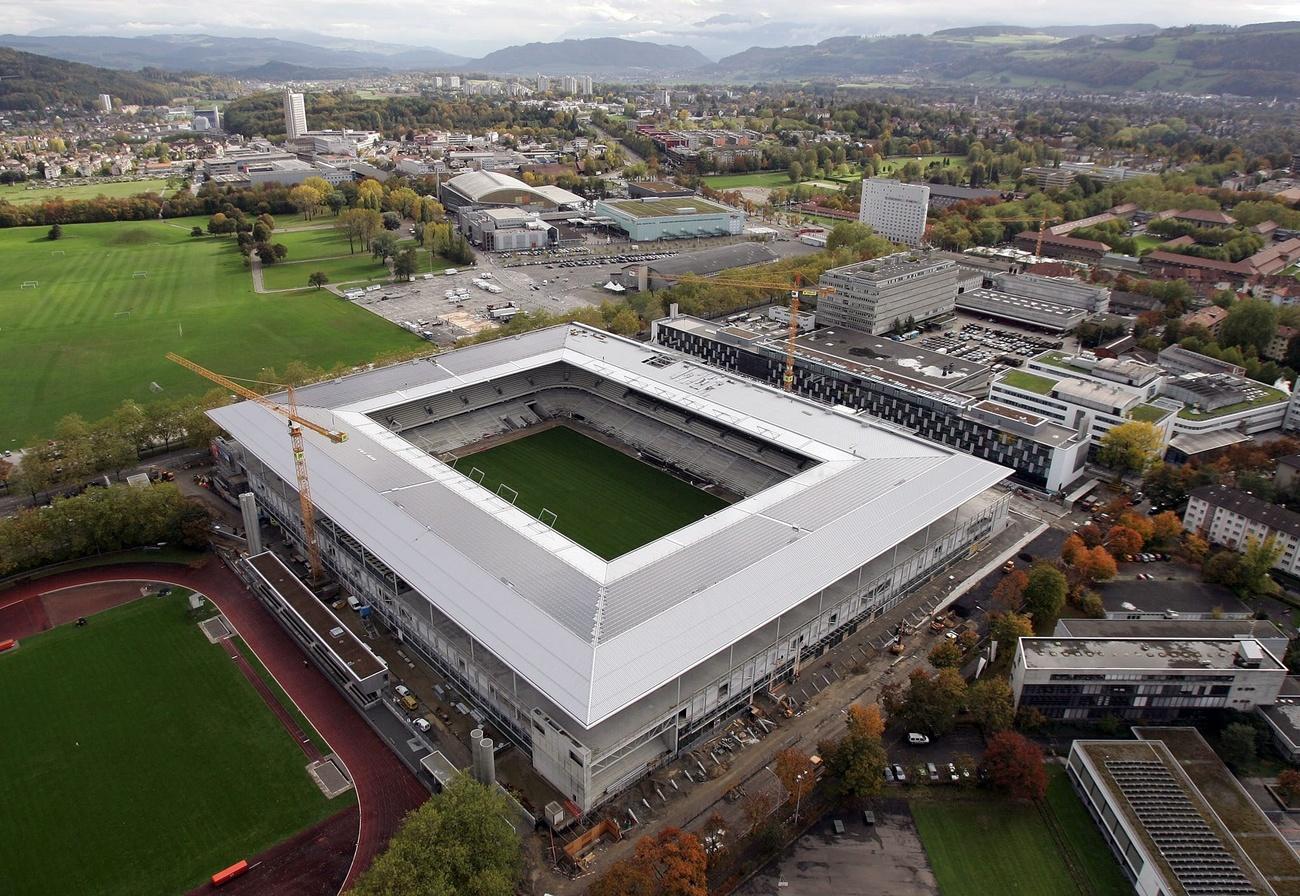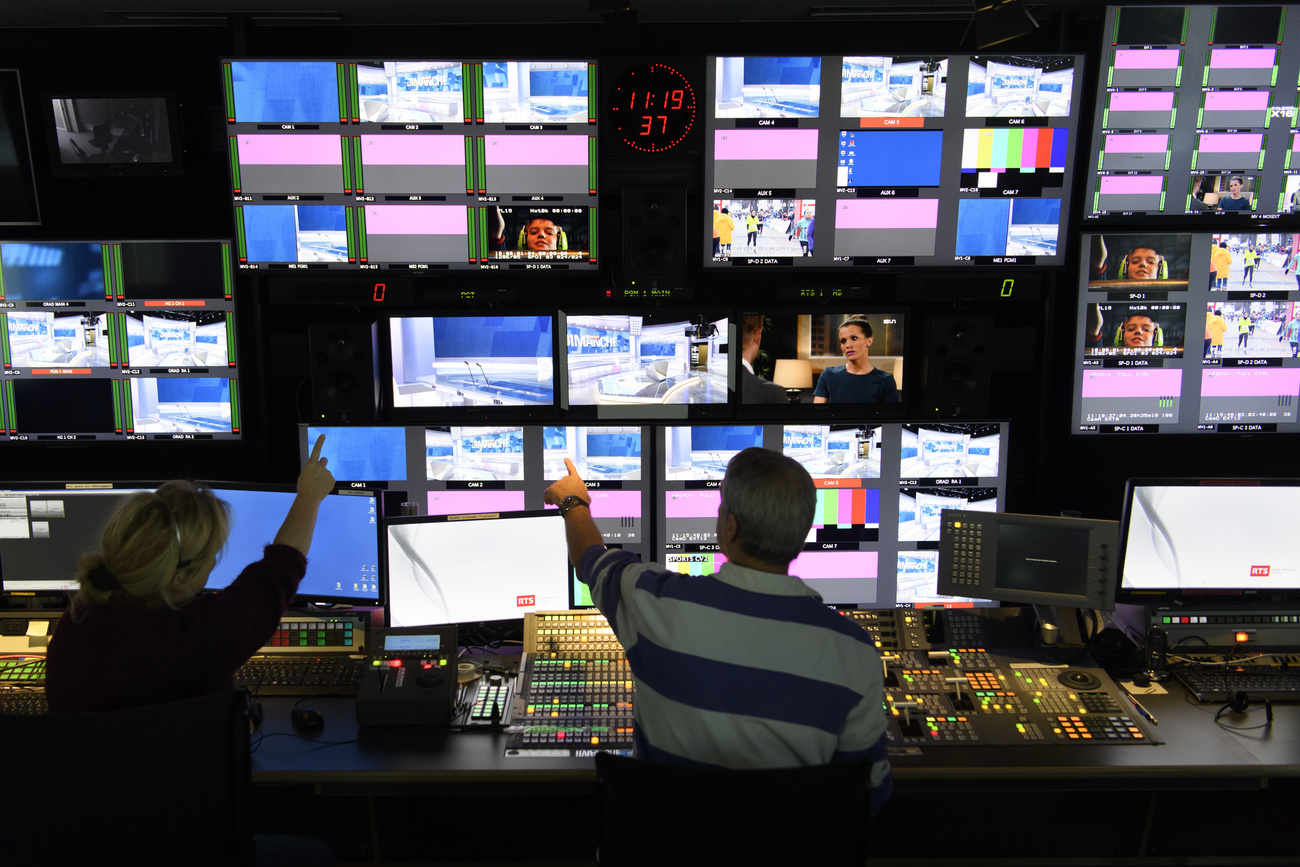
Can Swiss rapper Nemo crack the Eurovision code?

News that Switzerland is one of the favourites to win this year’s Eurovision Song Contest has got a country used to Eurovision disappointment thinking the unthinkable. However, victory would raise several tricky questions.
“‘La Suisse nul points, Switzerland no points’ – hardly any other event has hurt our national pride as much as the Eurovision Song Contest,” Swiss current affairs magazine Weltwoche lamented on Monday, three days before Nemo takes to the stage in Malmö, Sweden.
“Before Luca Hänni freed us from our eternal agony [coming fourth in 2019], we had to realise year after year what the rest of Europe thought of us: almost nothing.”
It’s true that Switzerland has gone home pointless more than any other country (a record it actually shares with Austria and Norway), but those days are over – if you believe the Swiss media.

More
Switzerland at Eurovision: the colourful hits and misses
What are Switzerland’s chances of winning this year?
Is it coming home? Is the Eurovision Song Contest returning to Switzerland 68 years after Swiss singer Lys Assia won the inaugural competition in Lugano? Yes, Céline Dion won for Switzerland in 1988, but as the (right-leaning) Weltwoche points out in its rather uncharitable articleExternal link, “the vocal wonder comes from Canada”.
British bookmakers reckon it’s a two-horse race this year between Nemo from Switzerland and Baby Lasagna from Croatia – things could get messy. Nemo’s entry, The Code, a feisty mixture of pop, rap, drum’n’bass and opera, was even outright favourite until Baby Lasagna staged a late comeback. The Code isn’t an easy one to perform live, but if Nemo can nail it, being unconventional has never been a bad thing at Eurovision, a “cheesy pop fest that is low quality, high camp”, according to The Economist.
If Nemo doesn’t win, it’s not for lack of local support. Excited fans from Nemo’s hometown of Biel/Bienne in northwestern Switzerland will be able to watch the drama at several public viewings. The semifinal on Thursday and the final on Saturday will also be broadcast in various bars and the Kino Rex cinema.
“I’m totally impressed by Nemo’s talent,” Jerry Heil, singing for Ukraine, told BlickExternal link. “Nemo’s song speaks to generations and has a message that reflects what many younger people are going through. It’s more than just a song. It’s a shared experience.”
“Nemo is super sweet, has a warm energy and I love Nemo’s style,” says Aiko, representing the Czech Republic, who gives the Swiss act a good chance. “Nemo has a great song, a charming personality and I’m excited to see what the team has come up with for the production in the show.”
Although Israel’s entrant Eden Golan has never met Nemo, she has admitted: “I love the Swiss song, it’s a great song and Nemo can sing really well.”
Who is Nemo?
Nemo Mettler is a 24-year-old rapper. In November Nemo came out as non-binary – not identifying with any specific gender – and asked to be referred to by the pronouns they/them.
“This story is my truth/I, I went to Hell and back/To find myself on track/I broke the code, whoa-oh-oh” – the lyrics of The Code certainly seem partly autobiographical, and Nemo explainedExternal link that “my truth is feeling comfortable with myself and realising I was non-binary. […] Just this feeling of being able to stand up for myself and be myself wherever I go is the biggest part of my truth”.
Nemo is by no means the first LGBTQ participant at Eurovision, which has had a significant fan base in the gay community for years. Previous winners include transgender singer Dana International in 1998 and drag artist Conchita Wurst in 2014 – “she forever redefined what Eurovision means to me,” Nemo says about Wurst. “Her performance was captivating, beautiful, and so meaningful.”
While Weltwoche sniffed that being non-binary “seems to be a characteristic that scores far more points in the parallel world of this musical freak show than any vocal power or sense of rhythm in the world”, support for Nemo has been overwhelmingly positive in the Swiss media.
The “exceptional talent” (Tages-Anzeiger) has enjoyed two title features in celebrity magazine Schweizer Illustrierte, and even the stolidly high-brow Neue Zürcher Zeitung, which, as Weltwoche put it, “otherwise only deals with these lowly aspects of the entertainment industry in passing”, has made the Eurovision Song Contest the main story in its culture section.
If Switzerland wins, where would the competition be held next year?
Without wishing to get ahead of ourselves, one of the conditions of Eurovision is that the winning country hosts it the following year (and qualifies automatically). So which Swiss city and venue would it be?
The competition has come quite a way since the Teatro Kursaal in Lugano hosted the 1956 contest, in which seven countries took part. In 1989, the year after Céline Dion’s victory, it was held at the Palais de Beaulieu in Lausanne, which could seat 1,600 people watching acts from 22 countries.
But a 19th-century casino and a convention centre built in 1921 no longer cut it. The Malmö Arena, for example, has a capacity of more than 15,000 for concerts.
Nemo would love the 2025 competition to be held in Biel/Bienne. But will the Swiss Broadcasting Corporation (SBC), SWI swissinfo.ch’s parent company, opt for the 6,500-capacity Tissot Arena? Never say never, but the favourites have to be the Hallenstadion in Zurich (13,000), the St Jakobshalle in Basel (12,400), the Geneva Arena (9,500) or the Bernexpo in Bern (a new 9,000-capacity hall is opening next spring).

More
Wankdorf: old name restored at historic Swiss stadium
Who would pay for it?
The Eurovision Song Contest, organised by the Geneva-based European Broadcasting Union (EBU), isn’t cheap. It’s rumoured that Ireland, which won four times in five years in the 1990s, was so desperate not to win again that it deliberately entered a dud.
The non-profit event is mostly financed by contributions from the participating broadcasters (the so-called participation fee), adding up to €6.2 million (CHF6 million), Eurovision explained in 2021External link. There is also a contribution from the host broadcaster, which is generally between €10 million and €20 million, depending on local circumstances and available resources, plus a contribution from the host city.
But it’s not all outgoings. There is commercial revenue from sponsorship agreements, ticket sales, televoting and merchandise, and there will of course be a tourism boost: Malmö is expecting some 100,000 visitors from around 90 countries.
So what does this mean for the Swiss Broadcasting Corporation? “Evil tongues are claiming that the SBC’s chief accountant is already in a cold sweat,” wrote Weltwoche. “A victory would be incompatible with the ‘halving initiative’.” This is a move to reduce the media licence fee from CHF335 to CHF200. The SBC has said it expects major job cuts if voters accept the initiative, for which no date has yet been set.

More
SBC expects major job cuts if licence fee is reduced
Last year more than 160 million people around the world watched the show in Liverpool. Votes were received from 144 countries. None of the millions of viewers will care about domestic Swiss politics when Nemo performs in the second semi-final on Thursday and then, hopefully, the final on Saturday.
Edited by Reto Gysi von Wartburg/dos

In compliance with the JTI standards
More: SWI swissinfo.ch certified by the Journalism Trust Initiative




























You can find an overview of ongoing debates with our journalists here . Please join us!
If you want to start a conversation about a topic raised in this article or want to report factual errors, email us at english@swissinfo.ch.